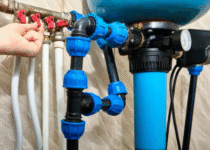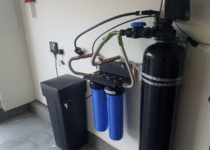Clean, Safe, and Worry-Free: Why Whole Home Water Solutions Matter More Than Ever
There’s something oddly comforting about turning on a tap and knowing the water that comes out is safe, clean, and reliable. We tend to take it for granted—until the day we don’t. Maybe you’ve noticed a strange odor, or your glasses come out of the dishwasher with cloudy spots that don’t scrub away. Maybe you’ve been reading too much about contaminants showing up in city reports. Whatever the case, water is one of those things you can’t afford to compromise on. That’s where the idea of investing in a complete home water system starts to make sense. Not just a filter under the sink, not just a pitcher in the fridge, but a long-term solution that keeps your entire household covered.
The Hidden World in Your Tap
Municipal water systems are impressive feats of engineering, but they’re not flawless. Pipes age, treatment plants deal with fluctuating demand, and natural disasters or industrial accidents can push unwanted elements into the supply. Even well water, which some people assume is more “pure,” can carry its own set of issues—like high iron, sulfur, or bacteria you’d rather not invite to dinner.
It’s the stuff you don’t see that makes the difference. Trace metals, chlorine byproducts, even microscopic organisms. None of these are what you want in the glass you hand to your child or in the pot of soup simmering on your stove.
Why Go All In With Whole Home Protection
For families who want peace of mind, a whole house water filtration installation service is often the answer. Instead of piecemeal fixes, this approach handles everything at the point where water enters your home. That means every shower, every laundry load, every sink in the house delivers cleaner water. You’re not just solving the problem in one corner—you’re addressing the system as a whole.
It’s not about paranoia. It’s about practicality. Once you’ve experienced the difference—better-tasting water, softer laundry, less soap scum in the bathroom—it’s hard to go back. The added bonus? Many homeowners find appliances like dishwashers and water heaters last longer when they’re not battling mineral buildup every day.
The Overlooked Hero: Water Softeners
If you’ve ever battled with stubborn white crust on faucets or struggled to get soap to lather, you already know the frustration of hard water. While not usually dangerous to health, hard water is a silent saboteur, wearing down pipes, clogging appliances, and making everyday cleaning a chore. That’s where a water softener quietly earns its keep.
Like any equipment though, softeners can have off days. When that happens, searching for a trustworthy water softener repair service near me becomes urgent. A properly maintained softener not only makes your water feel silky and your laundry brighter but also reduces the energy your appliances use. It’s a small piece of technology that carries a big impact on both your comfort and your wallet.
Don’t Forget the Invisible Threats
Not all contaminants leave clues you can see, smell, or taste. Some of the most serious—like bacteria and viruses—are invisible. While city treatment systems do their best, the journey from the treatment plant to your faucet is long, and things can go wrong along the way. For households that want to be extra cautious, one technology is gaining more attention: ultraviolet disinfection.
With a UV disinfection system installation, harmful microorganisms are neutralized using ultraviolet light before the water ever reaches your glass. It’s a chemical-free approach, which means no adding or altering the taste of your water. Parents of young children and caregivers for elderly family members often see this as an extra layer of protection. And honestly, with the unpredictability of today’s environment, it feels good knowing you’ve got a safety net in place.
What People Usually Miss
Here’s something worth pointing out—installing one piece of equipment doesn’t automatically solve everything. A filter won’t soften your water. A softener won’t kill bacteria. UV won’t catch heavy metals. It’s the combination, tailored to your particular water source, that creates real confidence.
That’s why it’s smart to start with a professional water test. It’s like a health check-up, but for your pipes. Once you know what you’re dealing with, you can decide whether you need just one system or a carefully balanced trio. Skipping this step is like buying medicine without knowing what you’re sick with—it might help, but it might also miss the point entirely.
The Cost Versus the Value
Of course, homeowners often pause at the price tag. Filtration systems, softeners, UV setups—they’re not impulse purchases. But here’s the kicker: over time, they pay for themselves. Less money spent on bottled water. Fewer repair bills for appliances clogged by mineral deposits. Longer lifespan for your plumbing. Even energy savings, since water heaters run more efficiently without scale buildup. And then there’s the intangible value: knowing you’re protecting your family’s health every single day. Can you really put a price on that?
Making It Fit Your Lifestyle
Every home is different. Some people live in old houses with antique plumbing. Others have new builds in neighborhoods with known water issues. Maybe you’re a busy family that goes through gallons every day, or maybe you’re just two people looking to downsize maintenance hassles. The beauty of today’s systems is flexibility. You can find compact setups for small spaces or robust designs that can handle the demands of a five-bedroom household.
If the idea feels overwhelming, start simple: test your water, identify the biggest issue, and address that first. You can always expand later. Think of it as building a safety net, one piece at a time.
A Closing Thought
Water doesn’t just wash dishes or rinse vegetables—it’s woven into every corner of daily life. It fuels your morning coffee, cools you down after a long run, and fills the bathtub where your kids splash around. Taking steps to improve its quality isn’t a luxury. It’s one of those quiet investments that ripples through your health, comfort, and home maintenance.
So the next time you turn on the tap, ask yourself: is this the water you want to live with for years to come? If not, maybe it’s time to look beyond quick fixes and toward a whole-home solution that leaves you with nothing to second-guess.



